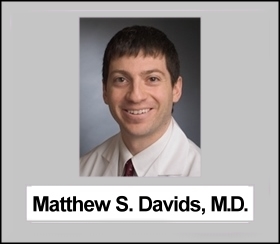
Matthew S. Davids, M.D.
___________
Associate Director, Center for Chronic Lymphocytic Leukemia
Assistant Professor of Medicine, Harvard Medical School
Attending Physician, Dana-Farber Cancer Institute
“It is truly an honor to receive a Young Scientist Award from the Lymphoma Foundation of America. As physicians, we are fortunate to regularly receive immediate gratitude as we care for our courageous patients; however, the rewards from our work as researchers are often less visible. Having the public recognition of the Young Scientist Award is both personally rewarding and helps to bring attention to our research, which we hope will benefit lymphoma patients across the country and around the world.
“My research in chronic lymphocytic leukemia (CLL) and indolent lymphoma has two major goals: - To help identify why lymphoma cells become resistant to treatment and
- To help develop novel combinations of therapies to overcome this resistance.
“My recent work in the laboratory has focused on trying to determine why CLL cells that are in lymph nodes and bone marrow (a.k.a. stroma) are more resistant to treatment than CLL cells in the blood. We found in the laboratory that certain drug treatments can cause CLL cells to be removed from stroma, and that this separation makes these cancer cells more likely to die. Moving forward, we are in the process of developing a clinical trial for CLL patients that uses one drug to mobilize CLL cells out of the lymph nodes and bone marrow and a second drug to kill these cells in the blood. Our hope is that the observations we made in the laboratory will now be proven to help CLL patients in the clinic. |


